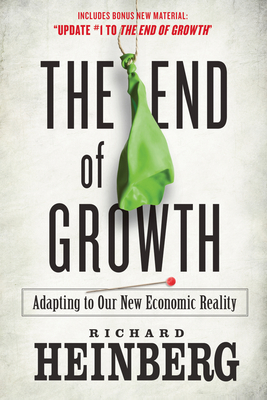Economists insist that recovery is at hand, yet unemployment remains high, real estate values continue to sink, and governments stagger under record deficits. The End of Growth proposes a startling diagnosis: humanity has reached a fundamental turning point in its economic history. The expansionary trajectory of industrial civilization is colliding with non-negotiable natural limits.
Richard Heinberg’s latest landmark work goes to the heart of the ongoing financial crisis, explaining how and why it occurred, and what we must do to avert the worst potential outcomes. Written in an engaging, highly readable style, it shows why growth is being blocked by three factors:
- Resource depletion
- Environmental impacts
- Crushing levels of debt
The End of Growth describes what policy makers, communities, and families can do to build a new economy that operates within Earth’s budget of energy and resources. We can thrive during the transition if we set goals that promote human and environmental well-being, rather than continuing to pursue the now-unattainable prize of ever-expanding GDP.
Richard Heinberg is the author of nine previous books, including The Party's Over, Peak Everything, and Blackout. A senior fellow of the Post Carbon Institute, Heinberg is one of the world's foremost peak oil educators and an effective communicator of the urgent need to transition away from fossil fuels.
Lynn says:
"That what is covered in this book isn't daily fare in the news both is and isn't in the least astonishing. Quarterly profits and political attention to election cycles trump the seemingly quaint calls for consideration of the next 7 generations. But fortunately, even for those whose eyes glaze over at the idea of reading an economics book, there are pleasant surprises to be found in The End of Growth. Sure it has lots of charts and graphs and the thesis might appear initially too pessimistic to appeal to any but dyed-in-the-wool Cassandras, but I assure you this is no tedious 'dismal science' text, nor is it a rant intent on assigning blame and stoking the fires of outrage against Wall Street. Instead, Heinberg offers up a Jared Diamond-like whirlwind tour of economic history, helping the reader make sense of the maddening crescendo of housing and other bubbles, shadow banks, derivatives, mortgage-backed securities, debt cycles, and human addiction psychology. It connects the dots we need to connect if we are ever to move beyond the fiscal obsession with what is fast becoming an archaic idea of 'stability' within highly dysfunctional systems designed during a truly extraordinary (and brief...it is coming to a close now) period of fossil-fuel abundance and the tremendous consumption that such easy abundance has spawned.
There are no simplistic answers presented alongside the plethora of weighty dilemmas arising in this book, but somehow Heinberg makes it all so fascinating as to be more invigoratingly challenging than demoralizing, since his concluding chapters investigate sustainability initiatives (ex: Transition Towns may be familiar to some since both Boulder and Denver have very active groups) that are developing resilience to face the realities of ecological limits. The manner in which we re-skill may actually be a welcome change for those who have understandably lost trust in the accelerating treadmill of modern economic life, however reluctant we may be to step outside our comfort or even discomfort (yet familiar) zones. Readers might like to explore further by visiting websites mentioned in the book or by brainstorming with family, friends and neighbors to plan for the adventure ahead.
This book is a valuable signpost to weather the coming months and years and a clear-eyed reality check that isn't afraid to deconstruct the enourmous elephant in the room: the geopolitical and economic ramifications of peak oil, climate change and the likelihood that real change is more likely to occur at the grassroots than from top-down management. Overcoming our learned helplessness and urban isolationism/anonymity presents a big challenge for those of us habituated to electronic communications outpacing our flesh-and-blood ones. We may have lived alongside others for years without ever really having essential conversations acknowledging the ecosystem we share, but Heinberg's book could prove a useful catalyst for rethinking prior expectations/entitlements for the sake of generations including and beyond our own."

No comments:
Post a Comment